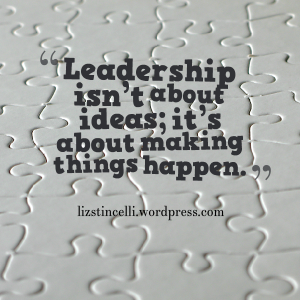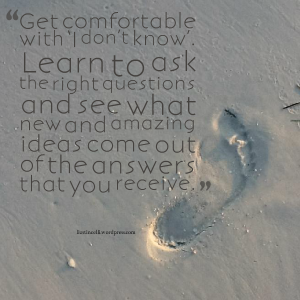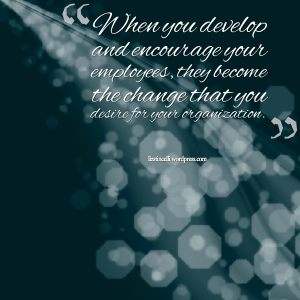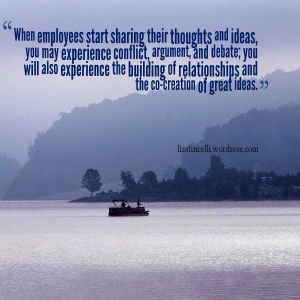Monthly Archives: June 2015
The Four I’s of Leadership: Inspiration, Influence, Innovation, and Impact
“Leadership is not about a title or a designation. It’s about impact, influence, and inspiration. Impact involves getting results, influence is about spreading the passion you have for your work, and you have to inspire team mates and customers.” — Robin S. Sharma
By Elizabeth Stincelli, DM
Leadership
While we may be able to make a list a mile long of factors that play a role in effective leadership, you will be well on your way if you can nail down the four I’s of leadership; inspiration, influence, innovation, and impact. These are key factors that will determine your ability to be effective in any other aspect of leadership. Leadership isn’t about ideas; it’s about making things happen. Focus your attention and energy on the four I’s of leadership and watch what happens.
Inspiration
John Quincy Adams said, “If your actions inspire others to dream more, learn more, do more, and become more, you are a leader.” A leader inspires and motivates colleagues. They can spark the passion and creativity that encourages others to accomplish amazing things. Inspiration is the beginning of everything else; seek it at every turn and in every corner. Use your inspiration to pursue something you believe in; use it to make things happen and to inspire greatness in others. Let your inspiration be the spark that lights a wild fire.
Influence
John Hancock explained, “The greatest ability in business is to get along with others and to influence their actions.” Influence is how you get things done as a leader. In order to influence others you must build trusting relationships and show genuine concern on an individual level. Be a role model of accountability, perseverance, and courage. Be respectful in all of your interactions. Earnestly motivate your employees to accomplish noteworthy tasks and provide recognition rather than seek it. Become a good listener, then follow through and follow up. Share your wisdom and be transparent in your words and actions. When you become someone who employees look up to, you will have the influence you need to lead.
Innovation
William Pollard believed, “Learning and innovation go hand in hand. The arrogance of success it to think that what you did yesterday will be sufficient for tomorrow.” Where will your success come from tomorrow? As a leader, you must focus your resources on challenging the status quo and helping others innovate. Reach across your organization for new and innovative ideas; fresh perspectives inspire fresh thinking. Leverage the disruptive opinions and opposing points of view you find in your organization to generate great ideas and question deeply held beliefs and assumptions. Provide a safe environment where employees can experiment and fail, then learn from that failure. Remember, innovation is never an end; it’s only a step in a continual process.
Impact
Sean Parker tells us, “I definitely wanted to earn my freedom. But the primary motivation wasn’t making money, but making an impact.” Ultimately, leadership is about getting results. Your leadership is not about you, it’s about creating a culture of accomplishment. It’s about making an impact by interweaving connections, challenges, and creative situations. Recognize that your leadership will have an impact, whether good or bad, on everyone who interacts with your organization. Leadership is about people; awaken in others the belief that they can accomplish extraordinary things and make them feel valued. And then, cultivate leadership in others; leave a legacy of impacting future leaders in such a positive way that they, in turn, will have the same impact on others.
Your Turn
According to Lao Tzu, “A leader is best when people barely know he exists, when his work is done, his aim fulfilled, they will say: we did it ourselves.” As a leader, your value will be determined, in part, by the four I’s of leadership. Are you an inspiration? Are you able to really influence others? Do you encourage innovation by dedicating time, support, and resources? And, are you making a positive impact? Four simple I’s that, if used correctly, will lift your employees and your leadership.
© 2015 Elizabeth Stincelli
Elizabeth Stincelli is passionate about recognizing and inspiring the leader in each of us. She is the CEO of Stincelli Advisors where she focuses on helping organizations engage employees and improve organizational culture. Elizabeth holds a Doctor of Management degree with an emphasis on organizational leadership.
Learn more about Elizabeth by visiting her website, stincelliadvisors.com and connect with her on Twitter @infinitestin, Google+, and LinkedIn. You can contact her by email at stincelliadvisors@gmail.com.
Get Comfortable With ‘I Don’t Know’
Leaders Don’t Need to Know all the Answers
“The wise man doesn’t give the right answers, he poses the right questions.” —Claude Levi-Strauss
By Elizabeth Stincelli, DM
You Don’t Need to Know the Answers
Ruth Benedict explained, “The trouble with life isn’t that there is no answer, it’s that there are so many answers.” No one person can know everything or have all the answers. When you get into the mindset that, as a leader, you must know all of the answers, you have immediately set yourself up for failure.
‘I don’t know’ is one of the hardest things to say. Somehow, these three little words make us feel inept. When, in all actuality, these three words might be the smartest thing you have ever said. Gore Verbinski advised us, “I think you can never ever lie, ever. If you don’t know, say ‘I don’t know’.” You don’t need to know all the answers; you just need to know how to ask the right questions.
So, get comfortable with ‘I don’t know’. Learn to ask the right questions and see what new and amazing ideas come out of the answers that you receive.
You Need to Ask the Right Questions
Indira Gandhi said, “The power to question is the basis of all human progress.” Asking questions with an open-mind allows you to step outside your point-of-view and see problems and situations in completely new ways. You must develop a growth mindset; asking questions with the curiosity of a child for which you do not already have an answer in mind.
Asking great questions can lead to innovative, new ideas. Intriguing questions can even open rabbit holes to greater questions. When we bring a diverse group of people together to contemplate stimulating questions, we may get fascinating answers. According to Eugene Ionesco, “It is not the answer that enlightens, but the question.”
Learn to let go of thinking that you need to have all the answers, learn to ask the right questions, and open a world of amazing possibilities.
© 2015 Elizabeth Stincelli
Elizabeth Stincelli is passionate about recognizing and inspiring the leader in each of us. She is the CEO of Stincelli Advisors where she focuses on helping organizations engage employees and improve organizational culture. Elizabeth holds a Doctor of Management degree with an emphasis on organizational leadership.
Learn more about Elizabeth by visiting her website, stincelliadvisors.com and connect with her on Twitter @infinitestin, Google+, and LinkedIn. You can contact her by email at stincelliadvisors@gmail.com.
Become the Change
Inspiring Change, One Person at a Time
“Things do not change; we change.”—Henry David Thoreau
By Elizabeth Stincelli, DM
Inspiring Change
Henry David Thoreau’s words serve as a strong reminder that only through changing ourselves do we change our circumstances. Just as leaders are not born, but are built by day-to-day behaviors, so are the changes in your organization. When you develop and encourage your employees, they become the change that you desire for your organization. The attention you give, the support you provide, and the example that you set shines as a beacon, inspiring change, one person at a time.
So, how can you inspire others to change?
Vision
The Dalai Lama said, “In order to carry a positive action we must develop here a positive vision.” If you want to inspire in others the desire to change as individuals, in order to spur change in your organization, you must put forth a strong, vivid vision that they can buy into. Everyone needs a clear understanding of where the organization is headed and how their activities contribute. You must create a sense of inclusion where every employee understands the role they play in working towards a worthwhile, positive vision.
Engagement
Rupert Murdoch believes, “In motivating people, you’ve got to engage their minds and their hearts.” You can’t bully or manipulate people into lasting change. They must follow you through thick and thin because they want to, because they are engaged, and they believe in you. Help your employees find their calling, engage them in using their talents for the good of the organization. Make their work meaningful. Build trust, help them develop their skills, and then give them control over their own work tasks. Help them succeed and then give credit for a job well done. When you invest in and engage employees, they become better and, as they become better, your organization becomes stronger.
Opportunity
Albert Einstein told us, “All that is valuable in human society depends upon the opportunity for development accorded the individual.” Only when you give others the opportunity to develop and grow as individuals will they become more valuable. And, only through increasing the value of individuals, can you bring about true and lasting change. Give employees the opportunity to be involved. Encourage them to dig deeper and challenge the status quo. As a leader, give of your time, sharing your knowledge and experience with employees to help them to grow and become the best they can be.
One Person at a Time
Change is built and sustained through everyday action, one person at a time. When you invest in helping your employees become the best they can be, you will build a strong capacity for lasting change. Put forth a compelling, positive vision that each employee can be part of. Engage them in their work; provide them the skills and resources necessary and then give them control. Open the doors of opportunity so employees can continue to grow. If you want change, you must inspire it, one person at a time.
© 2015 Elizabeth Stincelli
Elizabeth Stincelli is passionate about recognizing and inspiring the leader in each of us. She is the CEO of Stincelli Advisors where she focuses on helping organizations engage employees and improve organizational culture. Elizabeth holds a Doctor of Management degree with an emphasis on organizational leadership.
Learn more about Elizabeth by visiting her website, stincelliadvisors.com and connect with her on Twitter @infinitestin, Google+, and LinkedIn. You can contact her by email at stincelliadvisors@gmail.com.
Where do great ideas come from?
Help Employees Find Their Voice
“Find your voice and inspire others to find theirs.” —Stephen Covey
By Elizabeth Stincelli, DM
Why Help Employees Find Their Voice?
Employees want you, as a leader, to listen to what they have to say, to ask for their opinion, to not be confrontational, and to show respect and value for them as individuals and for their ideas. No one person has all the answers, not even you. When employees find their voice, you have access to a whole new set of ideas and answers. You have had the opportunity to find your voice, now help your employees find theirs. So, how can you help?
Sharing ideas
Ken Robinson said, “The role of a creative leader is not to have all the ideas; it’s to create a culture where everyone can have ideas and feel that they’re valued.” You must emphasize the importance of bringing a variety of ideas to the table. Let employees know that you value their thoughts and ideas. Encourage them to share; to voice their thoughts on both problems and solutions. These things cannot be done as isolated incidents; the value of EVERYONE sharing ideas must be woven into the very culture of the organization. Employees deserve the opportunity to share their ideas, to be engaged in their work, to be noticed in a positive way, and to contribute more value to the organization. It’s your responsibility, as a leader, to create a culture where employees can have a voice and thrive.
Overcoming fear
Georges St-Pierre explained, “For me, personally, when I’m afraid of something – when you’re afraid of something, normally you try to go away, you try to avoid it. Instead of avoiding it, to overcome your fear, I believe you need to embrace it.” As a leader, you need to set the example; show employees that you aren’t afraid to have the tough conversations, to be challenged or questioned, or to listen to things you don’t want to hear. Then encourage, instead of stifle, their voice. Help them to see that they can speak up without fear of confrontation or repercussions. Show them that you are there to listen without judgment or intimidation. Help them to overcome their fear so they can find their voice.
Creating community
Max Carver tells us, “Empathy is the starting point for creating a community and taking action. It’s the impetus for creating change.” When we find common ground, we can connect with others on a deeper level and we are able to empathize and understand where they are coming from. This allows us to feel that we are part of a community. Being part of a community enhances our willingness to communicate, collaborate, and support each other. As a leader, you must help create a sense of community where employees know they are part of something bigger than themselves and where they feel safe to share thoughts and ideas.
Give Employees a Voice
According to Margaret Heffernan, “For good ideas and true innovation, you need human interaction, conflict, argument, and debate.” If you want to improve employee satisfaction and the organization’s ability to innovate, give employees a voice. Encourage them to share ideas, help them overcome fear, and create a sense of community. When employees start sharing their thoughts and ideas, you may experience conflict, argument, and debate; you will also experience the building of relationships and the co-creation of great ideas.
© 2015 Elizabeth Stincelli
Elizabeth Stincelli is passionate about recognizing and inspiring the leader in each of us. She is the CEO of Stincelli Advisors where she focuses on helping organizations engage employees and improve organizational culture. Elizabeth holds a Doctor of Management degree with an emphasis on organizational leadership.
Learn more about Elizabeth by visiting her website, stincelliadvisors.com and connect with her on Twitter @infinitestin, Google+, and LinkedIn. You can contact her by email at stincelliadvisors@gmail.com.








